Unit 2 What time do you go to school单元复习课件(词组+句型+知识点+语法+写作指导+易错考点)
文档属性
| 名称 | Unit 2 What time do you go to school单元复习课件(词组+句型+知识点+语法+写作指导+易错考点) |

|
|
| 格式 | pptx | ||
| 文件大小 | 41.3MB | ||
| 资源类型 | 试卷 | ||
| 版本资源 | 人教新目标(Go for it)版 | ||
| 科目 | 英语 | ||
| 更新时间 | 2024-05-17 16:42:55 | ||
图片预览



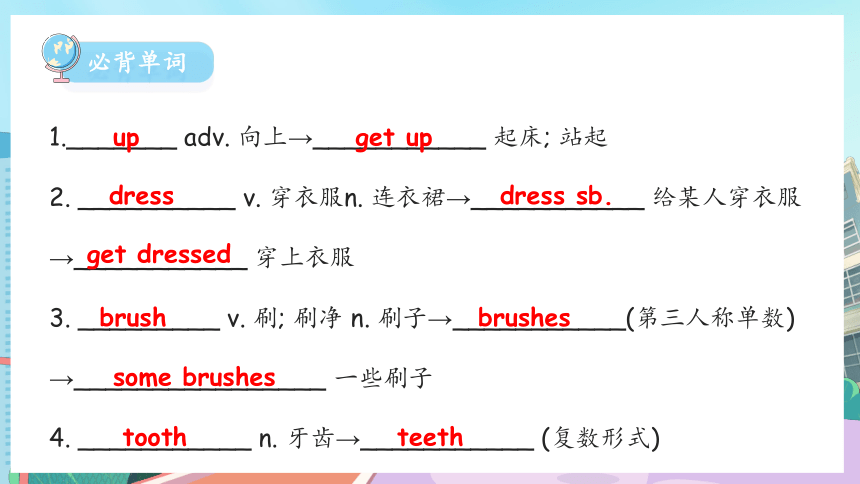
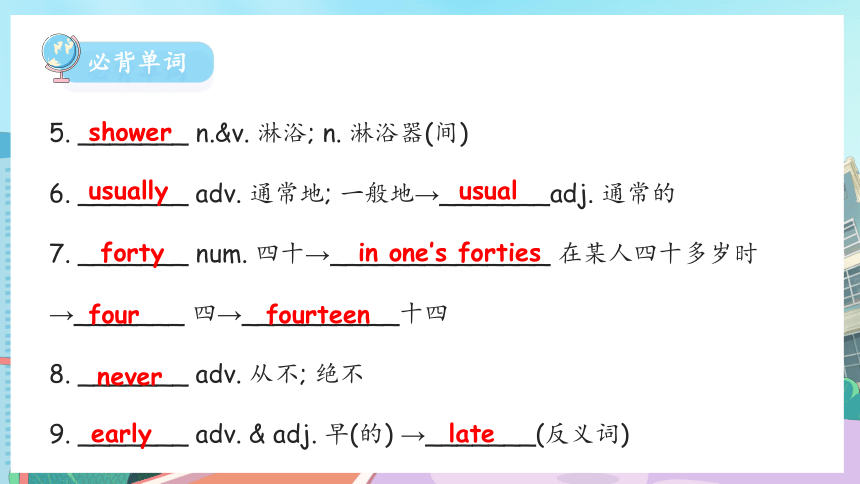
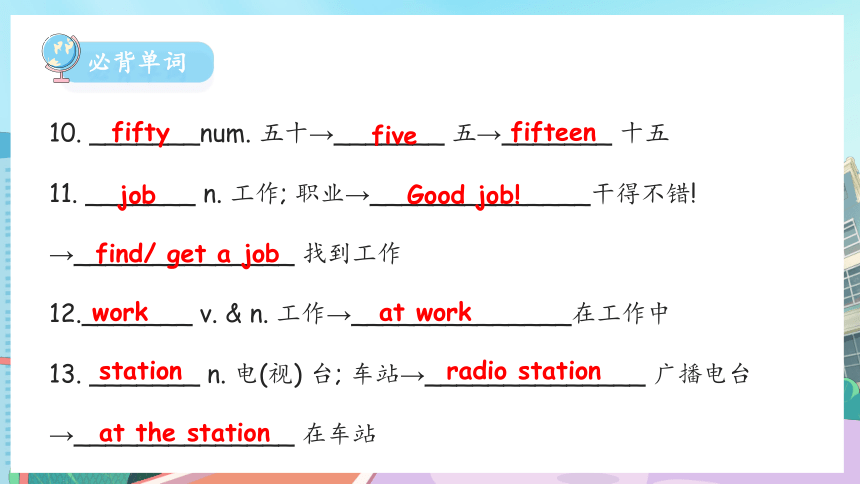
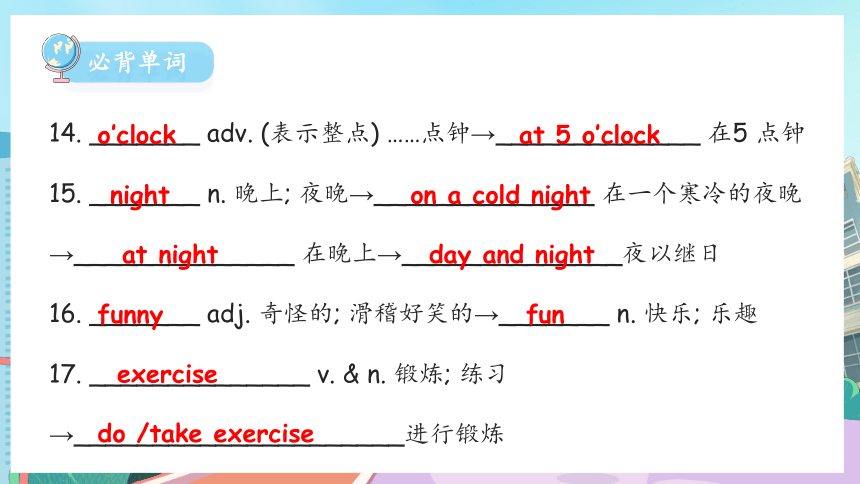
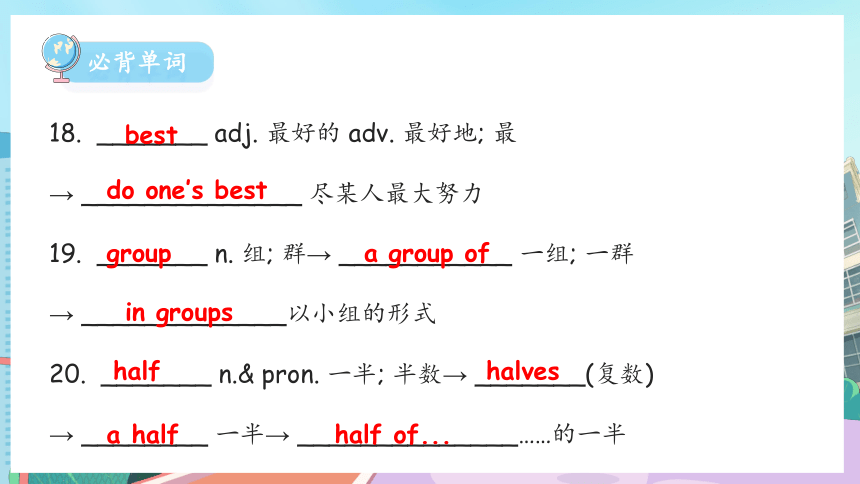

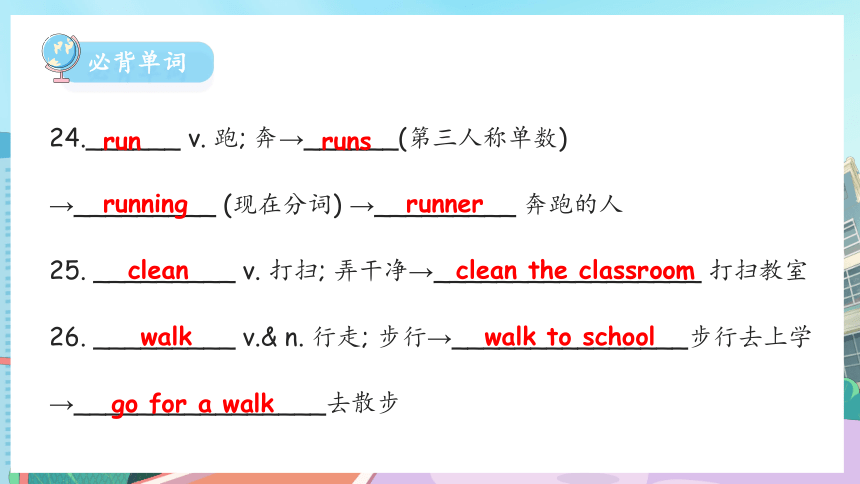
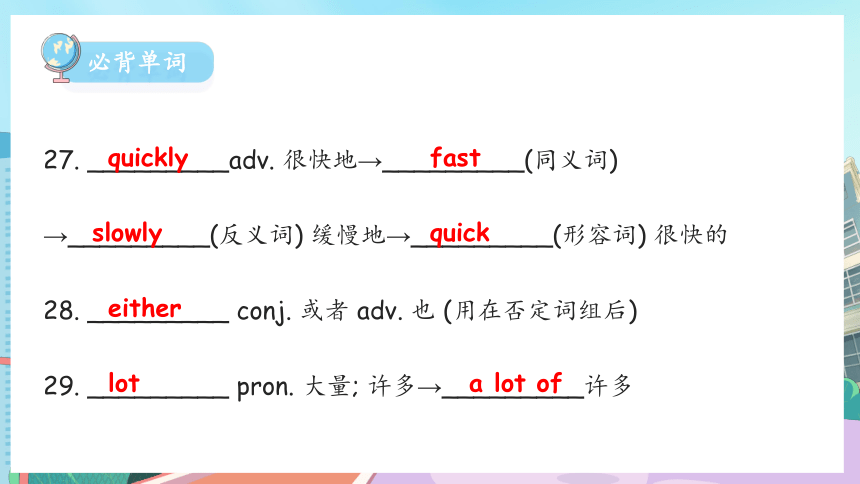
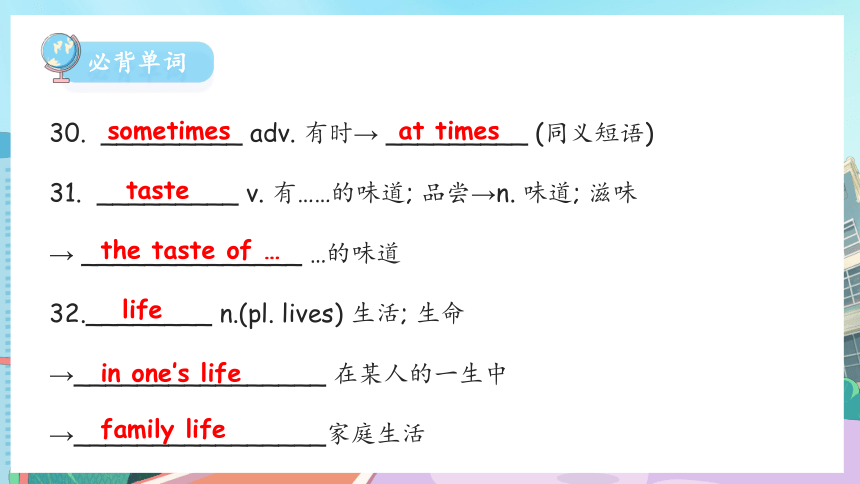
文档简介
(共171张PPT)
人教版七年级下册复习课件
Unit 2
What time do you
go to school
单元语法专项
知识点精讲
写作
指导
重点句型过关
单词词组过关
复习内容
单词词组过关
Part 1
必背单词
1._______ adv. 向上→___________ 起床; 站起
2. __________ v. 穿衣服n. 连衣裙→___________ 给某人穿衣服
→___________ 穿上衣服
3. _________ v. 刷; 刷净 n. 刷子→___________(第三人称单数)
→________________ 一些刷子
4. ___________ n. 牙齿→___________ (复数形式)
up
get up
dress
dress sb.
get dressed
brush
brushes
some brushes
tooth
teeth
必背单词
5. _______ n.&v. 淋浴; n. 淋浴器(间)
6. _______ adv. 通常地; 一般地→_______adj. 通常的
7. _______ num. 四十→______________ 在某人四十多岁时
→_______ 四→__________十四
8. _______ adv. 从不; 绝不
9. _______ adv. & adj. 早(的) →_______(反义词)
shower
usually
usual
forty
in one’s forties
four
fourteen
never
early
late
必背单词
10. _______num. 五十→_______ 五→_______ 十五
11. _______ n. 工作; 职业→______________干得不错!
→______________ 找到工作
12._______ v. & n. 工作→______________在工作中
13. _______ n. 电(视) 台; 车站→______________ 广播电台
→______________ 在车站
fifty
five
fifteen
job
Good job!
find/ get a job
work
at work
station
radio station
at the station
必背单词
14. _______ adv. (表示整点) ……点钟→_____________ 在5 点钟
15. _______ n. 晚上; 夜晚→______________ 在一个寒冷的夜晚
→______________ 在晚上→______________夜以继日
16. _______ adj. 奇怪的; 滑稽好笑的→_______ n. 快乐; 乐趣
17. ______________ v. & n. 锻炼; 练习
→_____________________进行锻炼
o’clock
at 5 o’clock
night
on a cold night
at night
day and night
funny
fun
exercise
do /take exercise
必背单词
18. _______ adj. 最好的 adv. 最好地; 最
→ ______________ 尽某人最大努力
19. _______ n. 组; 群→ ___________ 一组; 一群
→ _____________以小组的形式
20. _______ n.& pron. 一半; 半数→ _______(复数)
→ ________ 一半→ ______________……的一半
best
do one’s best
group
a group of
in groups
half
halves
a half
half of...
必背单词
21. _________ prep. 晚于; 过(时间) adj. 过去的
→___________ 六点半→___________ 在过去
22. ___________ n. 一刻钟; 四分之一
→______________…的四分之一→_______________ 四分之三
23. ___________ n. 家庭作业
past
half past six
in the past
quarter
a quarter of...
three quarters
homework
必背单词
24.______ v. 跑; 奔→______(第三人称单数)
→_________ (现在分词) →_________ 奔跑的人
25. _________ v. 打扫; 弄干净→_________________ 打扫教室
26. _________ v.& n. 行走; 步行→_______________步行去上学
→________________去散步
run
runs
running
runner
clean
clean the classroom
walk
walk to school
go for a walk
必背单词
27. _________adv. 很快地→_________(同义词) →_________(反义词) 缓慢地→_________(形容词) 很快的
28. _________ conj. 或者 adv. 也 (用在否定词组后)
29. _________ pron. 大量; 许多→_________许多
quickly
fast
slowly
quick
either
lot
a lot of
必背单词
30. _________ adv. 有时→ _________ (同义短语)
31. _________ v. 有……的味道; 品尝→n. 味道; 滋味
→ ______________ …的味道
32.________ n.(pl. lives) 生活; 生命
→________________ 在某人的一生中
→________________家庭生活
sometimes
at times
taste
the taste of …
life
in one’s life
family life
必背词组
1. go to school 去上学
2. be late for 迟到
3. brush teeth 刷牙
4. take a shower 洗淋浴
5. from...to... 从……到……
6. on weekends (在) 周末
7. do(one’s) homework 做作业
8. take a walk 散步;走一走
9. either...or...
要么……要么……; 或者……或者……
10. lots of 大量; 许多
1. My mother_________gets up at seven thirty in the morning.
2. Scott doesn’t have dinner with his family at_________ .
3. Her friend takes a shower at eight_________every day.
4.To be healthy, my grandpa _________ for an hour after dinner.
5. Tim goes to bed _________every day.
小练笔:用方框中所给单词的适当形式填空。
usually
night
fifty
exercises
early
重点句型过关
Part 2
必背句型
1. What time do you usually get up, Rick
里克, 你通常几点起床
2. When do you go to work 你什么时候去上班
3. —What time do you usually get up 你通常几点起床
—I usually get up at six thirty. 我通常在六点半起床。
4. She knows it’s not good for her, but it tastes good!
她知道这对她没好处, 但是它尝起来不错!
必背句型
5. —When do students usually eat dinner
学生们通常什么时候吃晚餐
—They usually eat dinner at a quarter to seven in the evening.
他们通常在晚上六点四十五分吃晚餐。
6. In the evening, I either watch TV or play computer games.
晚上, 我要么看电视, 要么玩电脑游戏。
小练笔:补全对话。(有两项多余)
A. When do you play games
B. I get home at five thirty.
C. What time do you usually get up on school days
D. I have lunch at school.
E. Classes begin at eight o'clock.
F. I usually have some bread and milk.
G. When do you get home
C
F
小练笔:补全对话。(有两项多余)
A. When do you play games
B. I get home at five thirty.
C. What time do you usually get up on school days
D. I have lunch at school.
E. Classes begin at eight o'clock.
F. I usually have some bread and milk.
G. When do you get home
E
G
B
语法精讲
Part 3
考点1:get up 起床
考向:go to bed 是get up 的反义短语,意为“上床睡觉”。
e.g. My brother gets up at 6:00 in the morning and goes to bed at 10:00 in the evening.
我弟弟早晨6 点起床,晚上10 点上床睡觉。
拓展:get up 还可意为“站起”。
e.g. Don’t sit on the floor. Get up, please!
不要坐在地上,请站起来。
和get相关的短语:
get to 到达 get on 上车
get off 下车 get back 返回
get down(从……)下来
get on well with...和……和睦相处
考点1:get up 起床
I _______ at 6 a.m. so I can leave for school at 7 a.m.
A. get up B. put up
C. take after D. get on
典型例题
【点拨】用短语辨析法。get up 起床;put up 张贴,搭建;
take after 像;get on 上车。由后文“我可以7 点动身去学校”可知,这里表达6 点起床。
考点2: up 向上
up / p/ adv.向上
e.g. The boy stands up and goes out.
这个男孩站起来,走了出去。
We watched as the sun went down.
我们看着夕阳西沉。
adv. 向下
考点3: go to school 去上学
辨析:go to school 与go to the school
go to school 去上学 表示去学校读书。
go to the school 去学校 只是表示去学校,不一定是去读书。
e.g. I don’t go to school today, but my father goes to the school to meet my teacher.
我今天没去上学,但是我父亲去学校见我的老师了。
考点3: go to school 去上学
拓展:“go to(+ 冠词) + n.”可表示参加音乐会、聚会、会议等,也可表示去做某事。
类似的词组还有:go to bed 上床睡觉、go to work 去上班等。
e.g. My parents and my brother often go to work by bike.
我父母和我哥哥经常骑自行车去上班。
We’ll go to a party this Sunday.
这个星期日我们要去参加一个聚会。
go home 回家
go on 继续
go over 仔细检查
go out 出去
go on a trip 去旅游
go away 离开;走开
go for a walk 去散步
go for a swim 去游泳
go shopping 去购物
go back 返回
与go相关
的短语
考点4: get dressed 穿上衣服
get dressed 穿上衣服
e.g. Let’s get dressed and go to the concert.
我们穿上衣服去音乐会吧。
Mr. Zhang is dressed in red/in a red jacket.
张先生穿着红色的衣服/ 一件红色的夹克衫。
易错点:
get dressed 为固定短语,后面不能跟宾语。
be dressed in + 衣服或表示颜色的词意为
“穿着……的衣服”或“穿……颜色的衣服”,表示穿的状态。
考点5: dress /dres/ v. 穿衣服 n. 连衣裙
dress 的具体用法:
dress 用作动词,意为“穿衣服”。
用作可数名词,主要指女士穿的连衣裙。复数形式为dresses。
dress 作动词时的常用结构:
① dress sb.(或oneself) 给某人(自己) 穿衣服
② dress up 盛装打扮
③ dress up as... 打扮成……
考点5: dress /dres/ v. 穿衣服 n. 连衣裙
e.g. The girl often dresses her little sister in the morning.
这个女孩经常在早晨给她妹妹穿衣服。
My favorite singer is wearing a beautiful dress.
我最喜欢的歌手穿着一件漂亮的连衣裙。
dress 后接宾语时,只能接表示人的名词或代词。
经典例题:The child doesn’t need any help. He is old enough
to d himself.
ress
考点6:brush v. 刷; 刷净 n. 刷子
考向:用作动词,意为“刷;刷净”,
第三人称单数形式为brushes。
brush one’s teeth 意为“刷牙”,其中one’s 是形容词性物主代词。
e.g. The boy is brushing his teeth with a toothbrush.
这个男孩儿正在用牙刷刷牙。
牙刷
考点6:brush v. 刷; 刷净 n. 刷子
拓展:用作可数名词,意为“刷子”,复数形式为brushes。
e.g. There are different brushes in the shop.
在这家商店里有不同的刷子。
经典例题:Alice always b her teeth after meals
to have good teeth.
rushes
考点7:tooth /tu θ/ n. 牙齿
考向:tooth 为可数名词,复数形式为teeth。
e.g. I’ve just had a tooth out at the dentist’s.
拓展:名词变复数不规则变化的词:
mouse → mice 老鼠
man → men 男人
child → children 小孩
woman → women 女人
男人女人a 变 e,
鹅足牙oo 变ee;
老鼠也好记,ous 变ic;
孩子加上 ren。
考点7:tooth /tu θ/ n. 牙齿
拓展:变复数时将“oo”变成“ee”的名词还有:
foot—feet (脚);goose—geese(鹅) tooth—teeth
典型例题: It’s important for children to clean their
___________ (tooth) every day.
teeth
考点8:shower /' a (r)/ n. 淋浴
take a shower= have a shower 淋浴
e.g. I usually brush my teeth and take a shower(= have a shower) at seven o’clock daily.
我通常每天七点刷牙、洗淋浴。
拓展:shower 的其他用法:
02
You can shower after getting up.
起床后你可以洗个淋浴。
v. 淋浴
There will be a shower this morning.
今天上午会有阵雨。
Can I use the shower now
我现在能用一下淋浴间吗?
n. 阵雨(雪);淋浴器(间)
01
考点9:at / t/ prep. 在(某处、某时间或时刻)
时间名词前介词的用法歌诀
表达时间有规范,介词放前没问题;
at 后面跟时刻,也与正午、午夜连;
月份、季节与年份,in 须奋勇站前边;
on 表具体某一天,日期、星期、节日前;
某天上午、下午与晚上,on 必担当无怨言。
拓展:辨析: at, in 与on 表示时间
at 常用于时刻前或一些习惯用语中。 at five o’clock 在五点钟
at noon/night 在中午/ 晚上
at that time 在那时
in 用在月份、季节、年份等前面, 也可以表示在早上、在下午或在晚上。 in May 在五月 in spring 在春季
in 2022 在2022 年 in the morning 在早上
on 用在具体日期、星期几、节日前, 也用来表示在具体某一天的上午、下午或晚上。 on Monday 在星期一
on Children’s Day 在儿童节
on the afternoon of July 8th
在7 月8 日的下午
on a cold morning 在一个寒冷的早晨
________ such a cold morning, I also got up ________ 6 o’clock
to go for a run as usual.
A. Before; in B. At; to
C. On; at D. In; at
典型例题
考点10:never /'nev (r)/ adv. 从不;绝不
考向:频度副词,表示事情发生的频率为零,表示否定的意义。用于实义动词之前,系动词、情态动词或助动词之后。
e.g. Mary never goes out alone at night.
玛丽晚上从不单独外出。
It is never too late to mend.
亡羊补牢,未为迟也。
反义词为always,“总是;一直”。
频度副词(频率从高到低):
always 总是 100%
usually 通常
often 经常
sometimes 有时
never 从不;绝不 0%
考点11:early/ (r) li/ adv.& adj. 早(的)
e.g. The early bus is very early, so we should get up early.
早班车非常早, 所以我们应该早起。
The early bird catches worms.
早起的鸟儿有虫吃。(谚语)
adj .作定语
adj .作表语
adv .作状语
考点12:work /w (r) k/ v.& n. 工作
work 在此处作不及物动词。
worker n.工作者;工作人员;工人。
e.g. My mother works in this school.
我妈妈在这所学校工作。
不及物动词
考点12:work /w (r) k/ v.& n. 工作
辨析: work 与job
work 泛指生活中的各类工作,是不可数名词。 注意: work 和job 有时可互换。
job 指具体的职业或工作, 是可数名词。 拓展:work 还可作名词,是不可数名词。
job 也可意为“工作”,二者区别如下:
考点12:work /w (r) k/ v.& n. 工作
e.g. No one wants to be out of work. 没有人想失业。
My job/work is teaching English. 我的工作是教英语。
Can you help me find work/a job in Shanghai
你能帮我在上海找到工作吗?
work at 从事于;致力于
out of work 失业
go to work 去上班
work out 计算出
at work 在工作中
与work相关的短语
My father has an interesting _______. He works at a radio
station. He has much _______ to do every day.
A. job; job B. job; work
C. work; job D. work; works
典型例题
【点拨】根据“My father has an interesting .”可知,此处应用可数名词,故用job;much 修饰不可数名词,故第二空用work。
考点13:station /'ste n/ n. 电( 视) 台;车站
station /'ste n/ n. 电( 视) 台;车站
e.g. My brother works at a radio station, but now he is at the bus station.
我哥哥在广播电台上班,但是现在他在公共汽车站。
考点13:station /'ste n/ n. 电( 视) 台;车站
funny/f ni/ adj. 奇怪的; 滑稽好笑的
e.g. You can tell a short funny story to make people laugh.
你可以讲一个简短而有趣的故事来逗人们发笑。
It’s funny that he comes early.
真奇怪,他来得这么早。
作定语
作表语
考点14:funny/f ni/ adj. 奇怪的; 滑稽好笑的
station /'ste n/ n. 电( 视) 台;车站
e.g. My brother works at a radio station, but now he is at the bus station.
我哥哥在广播电台上班,但是现在他在公共汽车站。
a TV station 电视台
a police station 警察局
a coach station 长途汽车站
a radio station
广播电台
a train station
火车站
a bus station
公共汽车站
a subway station 地铁站
a gas station 加油站
与station相关的短语
a railway station
火车站
温馨提示:
① fun(乐趣)+-ny=funny 有趣的。
② funny 和fun 都有“有趣”之意,
funny 指的是一种滑稽可笑的“有趣”。
考点14:funny/f ni/ adj. 奇怪的; 滑稽好笑的
拓展: :(1) fun 用作形容词,意为“有趣的;使人快乐的”。
e.g. —Let’s play games. 我们玩游戏吧。
—That sounds fun. 那听起来有趣。
(2) fun 用作不可数名词,意为“乐趣;快乐”。have fun 意为“玩得开心”;have fun doing sth. 意为“做某事很开心”。
e.g. I hope you’ll have fun at the party.
我希望你在聚会中过得愉快。
This dog looks _______. It’s wearing red shoes.
A. clever B. brave
C. funny D. careful
典型例题
【点拨】用语境判定法。由“它穿着红色的鞋子。”可知,这只狗看上去很有趣。funny 意为“有趣的”。
考点15:...time for... 表示“做……的时间”
考向:..time for sth 表示“做……的时间”
e.g. Tom’s mother has enough time for shopping today.
今天汤姆的妈妈有足够的时间购物。
He has little time to sleep. 他几乎没有时间睡觉。
It’s time for lunch/to have lunch. 该吃午饭了。
It’s time for us to go to the concert.
到我们去音乐会的时间了。
相当于
...time to do...
句型辨析:
It's time for sth / It's time to do...
到了该(做)……的时候了。
It's time for sb. to do sth.
到了某人该做某事的时候了。
考点16:exercise /eks sa z/ v.& n. 锻炼; 练习
exercise v. 锻炼
n. 不可数名词,“锻炼;运动”,常与take、do、get 等词连用。
可数名词,“训练活动;练习;习题”。
考点16:exercise /eks sa z/ v.& n. 锻炼; 练习
e.g. It’s very important to exercise every day. 每天锻炼很重要。
The man often exercises his arms and legs.
这个男人经常锻炼他的胳膊和腿。
Don’t sit in front of the computer for too long. Stand up and take some exercise. 不要在电脑前坐太久。站起来运动一下吧。
He asked the students to do some grammar exercises.
他让学生做了一些语法练习。
We do morning exercises and eye exercises every day.
我们每天做早操和眼保健操。
不及物动词
及物动词
To keep healthy, Daming’s grandparents _______ in a park every
day.
A. exercise B. cough
C. sleep D. wait
典型例题
【点拨】exercise 锻炼;cough 咳嗽;sleep 睡觉;wait 等待。根据“To keep healthy”可知此处指锻炼。
考点17:so /s / conj. 所以; 因此
so /s / conj. 所以; 因此
e.g. Math is interesting, so I like it.
= I like math because it’s interesting.
数学很有趣,所以我喜欢它。
易错点:
so 作连词,意为“所以;因此”,表示因果关系。
可与because 引导的原因状语从句进行互换。so 与because 不能出现在同一个句子中。
考点18:be late for... ……迟到
e.g. The next morning, Erin was late for breakfast.
第二天早晨,艾琳吃早餐迟到了。
Are you often late for school
= Do you often come to school late
你经常上学迟到吗?
be late for ...
=come to ... late
……迟到
考点19:best /best/ adj. 最好的 adv. 最好地;最
考向1:作形容词,是good 的最高级形式,前面通常加the。
e.g. She says this is the best idea. 她说这是最好的主意。
考向2:作副词,是well 的最高级形式。
e.g. I think I like spring best. 我想我最喜欢春天。
good adj.好的
well adv.好
原级
better
adj.更好的
adv.更好
比较级
best
adj.最好的
adv.最好地
最高级
I’m pretty good at tennis. Actually, I’m probably ________ in
the club.
A. worse B. good C. better D. the best
典型例题
【点拨】由后面表范围的“in the club”可知,此处是“我”
与俱乐部里的其他所有成员进行比较,故用形容词最高级。由“I’m pretty good at tennis.”可知,此处应是指“最好的”。
Which colour do you like _______, purple, orange or pink
A. well B. good
C. better D. best
典型例题
考点20:group /ɡru p/ n. 组;群
考向:group 是集合名词,
强调整体时,谓语动词用第三人称单数形式;
强调成员时,谓语动词用复数形式。
e.g. Our group has four girls. 我们组有4 个女孩。
The whole group are young. 整个小组的成员都非常年轻。
A group of girls are cleaning the room.
一群女孩正在打扫房间。
考点20:group /ɡru p/ n. 组;群
group 的常用搭配:
① in one's group 在某人的组中
② in groups 成群结队地;分组
③ a group of...一群……
(后接可数名词复数,作主语时,谓语动词用复数形式)
考点21:half /hɑ f/, /h f/ n. & pron. 一半;半数
考向:half 的复数形式为halves。
half of ... 意为“……的一半”;
in half(=into halves) 意为“分成两半”。
易错点:“half of+ 复数名词/复数代词”作主语时,谓语动词用复数形式。“half of+不可数名词/单数名词/单数代词”作主语时,谓语动词用单数形式。
考点21:half /hɑ f/, /h f/ n. & pron. 一半;半数
e.g. Let’s cut the apple into halves.
我们把这个苹果切成两半吧。
Half of the books are about music.
一半的书是关于音乐的。
Half of the apples are red.
一半的苹果是红色的。
Half of the apple is red.
这个苹果一半是红色的。
作名词
作代词,也可说成Half the books。后面是代词时不能这么用。
考点21:half /hɑ f/, /h f/ n. & pron. 一半;半数
拓展:“几个半”的表达:
基数词+ 可数名词单/ 复数+ and + a half
基数词+ and a half + 可数名词复数
e.g. one hour and a half = one and a half hours 一个半小时
two days and a half = two and a half days 两天半
基数词是one 时,
名词用单数。
half 的常用搭配:
① half a day 半天
② half an hour 半小时
③ half the money 一半的钱
考点22:past /pɑ st/, /p st/ prep. 晚于;过( 时间) adj. 过去的
考向:past 用来表示时间,用于分钟数不超过30 的情况。“half past + 整点时间”表示“几点半”。
e.g. It is twenty past seven. 现在是七点二十分。
past 的相关短语:
① in the past 在过去 ② go past 经过
考点22:past /pɑ st/, /p st/ prep. 晚于;过( 时间) adj. 过去的
拓展:past 的其他用法:
past adj. 过去的
e.g. These things happened in the past years.
这些事情发生在过去的年代里。
prep. 经过……(的旁边)
e.g. You can see my brother when you go past the park.
当你经过公园时,你能看到我弟弟。
—What time is it
—It’s half ________ seven.
A. past B. to C. at
典型例题
考点23:quarter /kw (r) t (r) / n. 一刻钟;四分之一
quarter /kw (r) t (r) / n. 一刻钟;四分之一
e.g. A quarter is fifteen minutes. 一刻钟是15 分钟。
A quarter of a dollar is 25 cents.
四分之一美元是25 美分。
Three quarters of the boys in our class like music.
我们班上四分之三的男生喜欢音乐。
考点23:quarter /kw (r) t (r) / n. 一刻钟;四分之一
辨析:quarter 与half
At a __________ (一刻钟) past seven last night, I was watching
a documentary about space.
典型例题
quarter
考点24:homework /'h mw (r)k/ n. 家庭作业
词组:do homework
homework 是不可数名词,不能用many 修饰,但可用much,a lot
of,lots of 等修饰。do (one’s) homework 意为“做(某人的) 作业”,其中one’s 用形容词性物主代词或名词所有格。
考点24:homework /'h mw (r)k/ n. 家庭作业
e.g. How much homework do you do every day
你们每天做多少家庭作业?
My son is able to do his homework by himself.
我儿子能独立做他的家庭作业了。
构词法记单词:
home(家) + work(工作)= homework(家庭作业)
house(家) + work(工作)= housework(家务)
考点25:run /r n/ v. 跑;奔
run /r n/ v. 跑;奔
e.g. She runs for half an hour every morning.
她每天早晨跑半小时。
The boy is good at running. He runs with other runners in the park every morning.
这个男孩擅长跑步,每天早上他都与其他跑步者一起在公园里跑步。
run 的现在分词形式
跑步者
考点25:run /r n/ v. 跑;奔
拓展:run 用作动词还可意为“经营;管理”。
e.g. The young man runs a big supermarket.
这个年轻人经营着一家大超市。
考点26:clean /kli n/ v. 打扫;弄干净 adj. 干净的
clean /kli n/ v. 打扫;弄干净 adj. 干净的
e.g. Please clean your room and keep it clean.
请打扫你的房间并保持整洁。
People also cleaned up the park and the river.
人们还清理了公园和河流。
I often do some cleaning after school.
我经常在放学后打扫卫生。
反义词为dirty v. 弄脏;变脏 adj. 肮脏的
作动词
作形容词
清理,打扫干净
考点26:clean /kli n/ v. 打扫;弄干净 adj. 干净的
clean 的词形变化:
cleaner n. 清洁工
cleaning n. 清洁
do some cleaning 打扫卫生
考点27:take a walk 散步;走一走
take a walk 散步;走一走
take a walk=take walks=have a walk =go for a walk。
e.g. Let’s take a walk. 我们去散步吧。
拓展:walk 的用法:
walk n. 步行,行走
e.g. How about going for a walk 去散步如何?
v. 步行,行走
e.g. He often walks to school. 他经常步行去上学。
“take + 名词”构成的短语:
① take a look 看一看
② take a rest 休息一下
考点28:quickly /kw kli/ adv. 很快地
词组:eat quickly 吃的很快
e.g. That man runs very quickly. 那个男人跑得非常快。
quick(adj . 快的)
反义
slow(adj . 慢的)
quickly(adv . 很快地)
反义
slowly(adv . 缓慢地)
考点28:quickly /kw kli/ adv. 很快地
辨析:quickly,fast与soon
quickly 很快地 强调动作发生或完成得快,也可指人的思维敏捷。
fast 迅速(的) 地 强调动作速度之快,既可作形容词,也可作副词。作副词时常与quickly 互换。
soon 不久 侧重两件事情先后发生,中间的间隔时间很短。
考点28:quickly /kw kli/ adv. 很快地
e.g. Jack is a fast boy. Every school day, he gets up and eats
breakfast quickly. And soon he gets to school.
杰克是个麻利的男孩儿。每个上学日他快速起床、吃早餐。并且很
快他就到了学校。
拓展:quickly 的形容词形式是quick“快的”。英语中的形容词变副词时,一般在形容词后加-ly。
e.g. sad(adj. 难过的)→ sadly(adv. 难过地)
quiet(adj. 安静的)→ quietly(adv. 安静地)
—Excuse me, could you please tell me where I can get some food _________ (quick)
—Sure, there is a restaurant on Center Street.
典型例题
【点拨】空格处修饰“get”,应用副词。
quickly
考点29:sometimes /s mta mz/ adv. 有时
表示频率,用how often 提问
sometimes 在句中的位置比较灵活,可位于句首、句中或句末。
e.g. Sometimes my parents have meals out of doors.
有时我的父母在户外进餐。
辨析:sometimes, some times, some time 与sometime
sometimes 是频度副词,意为“有时”,相当于at times 或from time to time。
some times 表次数, 意为“几次”。
some time 有两个用法: 用作副词短语,意为“某个时候”
(= sometime);用作名词短语,意为“一段时间”。
sometime 意为“某个时候”,可用于将来时或过去时。
速记小法:
分开“一段”(some time),
连“某时”(sometime);
分开s 表“几次”(some times),
相连s 是“有时”(sometimes)。
e.g. I sometimes watch television in the evening.晚上我有时看电视节目。
The foreigner went to the Great Wall some times when he was in China. 当这个外国人在中国时,他去了好几次长城。
Phone me some time next week.
下个星期什么时候给我打个电话吧。
The little girl thought about this for some time.
这个小女孩对此想了一段时间。
Maybe we’ll meet our favorite writer sometime.
也许我们在某个时刻将会见到我们最喜欢的作家。
1.He sometimes takes a walk with his mom. (对画线部分提问)
________ ________ ________ he take a walk with his mom
2.He usually goes to school by bus, but ____ he rides a bike.
A. sometime B. some time
C. sometimes D. some times
典型例题
How often does
考点30:either /'a (r)/, /'i (r)/ conj. 或者 adv. 也
考向1:作连词,意为“或者”,常和or 组成either ... or ... 结构。
e.g. We can do the shopping either online or at the shop.
我们可以在网上或在商店购物。
考向2:作副词,意为“也”,用于否定句中。
e.g. Peter can’t go and I can’t either. 彼得不能去,我也不能。
考点30:either /'a (r)/, /'i (r)/ conj. 或者 adv. 也
拓展:
(1) 作代词, 表示“(两者中的) 任何一个”, 构成短语“either of ...”。
e.g. Either of the two boys is from Beijing.
两个男孩儿中有一个来自北京。
— Would you like some orange juice or coffee
你想要些橙汁还是咖啡?
— Either is OK. I don’t mind. 任何一种都可以。我不介意。
考点30:either /'a (r)/, /'i (r)/ conj. 或者 adv. 也
拓展:
(2) 限定词,意为“两者之中任何一个的”,修饰可数名词单数。
e.g. You can park on either side of the street.
这条街两边都可以停车。
易错点:
① either 用作代词,在句中作主语时,谓语动词用单数;
②用作限定词作定语时,只能修饰可数名词单数。
— There are two books about traditional Chinese tea-making culture.
—You’re free to take _______ of them and leave one for me.
A. all B. either C. neither D. none
典型例题
【点拨】all 所有;either (两者之中) 任意一个;neither 两者都不;none 没有一个。根据“There are two books”和“leave one for me”可知,要留下一本,即可以拿走两本书中任意一本,either 符合题意。
考点31:either ... or ...
either ... or ... 要么……要么……;或者……或者……
用来连接两个并列的单词、短语或句子,表示两者之一。
e.g. My brother either plays basketball or listens to music.
我哥哥要么打篮球,要么听音乐。
Jack eats either hamburgers or bread for breakfast.
杰克早餐要么吃汉堡包要么吃面包。
Either his sisters or he likes music.
要么他的姐姐们喜欢音乐,要么他喜欢音乐。
辨析:either...or..., neither...nor...与 both...and...
either...or ... 或者……或者…… Either she or I am right.
她和我有一个人是对的。
neither...nor ... 既不……也不…… Neither she nor I am right.
她和我都不对。
both...and ... ……和……都 Both she and I are right.
她和我都对。
特别提醒:
either ... or ...在句中连接两个并列的成分。连接两个并列主语时,谓语动词和最近的主语保持一致,即遵循“就近原则”。
— What would you like to have for supper, Jack
—Either noodles or rice ______ OK. I don’t mind.
A. are B. were C. is D. was
典型例题
【点拨】用主谓一致法。either ... or ... 连接两个并列的主语时,谓语动词与邻近的主语保持一致;rice 是不可数名词,且本题时态为一般现在时,故be 动词用is。
______ Tom ______ Tim is going with you because one of them must stay at home.
A. Either; or B. Neither; nor
C. Both; and D. Not only; but also
典型例题
考点32:lots of 大量;许多
e.g. We have lots of things in common besides music.
除了音乐,我们有很多共同点。
He drank lots of milk.
他喝了许多奶。
修饰可数名词复数
修饰可数名词复数
易错点
lots of (= a lot of)常用于肯定句中,既可修饰可数名词复数(=many),又可修饰不可数名词(= much)。
考点32:lots of 大量;许多
拓展:a lot 意为“很;非常”,修饰形容词,也可与动词(短语) 连用, 相当于 very much。
e.g. It doesn’t interest you a lot.
它不太让你感兴趣。
地震后,政府向当地人捐赠了大量的钱款和物资。
After the earthquake, the government gave away _________________ money and things to the local people.
典型例题
lots of / a lot of
考点33:taste /te st/ v. 有……的味道;品尝 n. 味道;滋味
考向1:作系动词,“尝起来;有……的味道”,后接形容词。
e.g. The soup tastes delicious. 这个汤尝起来很美味。
考向2:作实义动词,“尝;品尝”,后接名词或代词。
e.g. Tom smelt the mooncake and then tasted it.
汤姆闻了闻月饼,然后尝了它。
考点33:taste /te st/ v. 有……的味道;品尝 n. 味道;滋味
考向3:作名词,“味道;品位”。
e.g. I don’t like the taste of this coffee.
我不喜欢这种咖啡的味道。
The colour and style is a matter of personal taste.
颜色和样式是个人品味的问题。
The soup ______ a little salty (咸的), and there is no need to add
more salt.
A. looks B. smells
C. sounds D. tastes
典型例题
【点拨】根据句意可知,汤应该是尝起来有点咸。
考点34:have a ... life 过着……的生活
e.g. Now, in China, we are having / living a happy life.
现在,在中国,我们过着幸福的生活。
考向:“Sb. have/has a very +形容词+ life.”意为“某人过着非常……的生活。”,也可表达为“Sb. live(s) a very ... life.”。
考点35:healthy /'helθi/ adj. 健康的
词组:keep/stay healthy 保持健康
e.g. Be sure to eat healthy meals and get at least eight hours of sleep.
一定要健康饮食,保证得到至少8 个小时的睡眠。
Avoid unhealthy foods such as hamburgers and chips.
不要吃不健康食品,如汉堡和薯条。
考点35:healthy /'helθi/ adj. 健康的
His grandparents are in good health.
他的祖父母健康状况良好。
This knowledge can help people eat more healthily.
这一知识可以帮助人们吃得更健康。
be in good/poor health
健康状况良好/不好
healthy 的词形变化:
unhealthy adj. 不健康的
health n. 健康
healthily adv. 健康地
多吃蔬菜和水果有助于人们保持健康。
Eating more vegetables and fruits helps people
_______________________.
典型例题
(to) keep/stay healthy
考点36:life /la f/ n. 生活;生命
life “(某种方式的) 生活”, 既可用作可数名词也可用作不可数名词。 He has a busy life every day.
他每天过着忙碌的生活。
“性命;人命”, 既可用作可数名词也可用作不可数名词。 He saved many lives in the
earthquake. 他在那次地震中救了很多人的命。
“一生, 终身”, 既可用作可数名词也可用作不可数名词。 The writer writes lots of books in her life. 这位作家在她的一生中写了许多书。
考点36:life /la f/ n. 生活;生命
拓展: life 的复数形式为 lives, 类似的名词变复数还有:
wife → wives, half → halves, leaf → leaves,
shelf → shelves, thief → thieves, knife → knives,
wolf → wolves。
save one’s life 救某人的命
lose one’s life 丧生
come to life 变得活跃
in daily life 在日常生活中
in one’s life 在某人的一生中
与life相关的短语
单元语法专项
Part 4
语法点1:询问时间与时间表达法
询问时间 提问 What time/When + 助动词+ 主语+ 动词原形+ 其他?
What time/When + be 动词+ 主语+ 其他?
回答 回答what time/when 引导的问句,可以用in,on 或at 等构成的表示时间的介词短语。
区别 what time 询问事情发生的具体时刻。
when 可用于询问具体时刻,也可用于询问日期(某年、某月、某日)。
语法点1:询问时间与时间表达法
询问时间的句型以及回答:
① 问句句型:
What time/When + 助动词+ 主语+ 动词原形+ 其他?
What time/When + be 动词+ 主语+ 其他?
② 答语:回答what time/when 引导的问句,可以用in,on 或at 等构成的表示时间的介词短语。
语法点1:询问时间与时间表达法
e.g. —What time does Jack play the guitar
杰克什么时候弹吉他?
—At 7:00 every morning. 每天早晨7 点。
—When is your birthday 你的生日是什么时候?
—In April. /On April 19th. 在四月。/ 在四月十九日。
—_______ do you usually start doing your homework
—Right after finishing my dinner.
A. When B. Where
C. What D. Why
典型例题
【点拨】用前后照应法解题。由答语“吃完晚饭马上(做)”可知,问句问开始做作业的时间,故用When 进行提问。
语法点2:时间表达法
时间 表达法 整点 “整点数+ o’clock”或“整点数”。 非整点 顺读法 “先时后分”。先读整点数,再读分钟数,都用基数词来读。当分钟数小于10 时,遇到数字0,发字母o 的音/ /。
逆读法 分钟数小于30 时,用“分钟数+ past + 整点数”表示。
分钟数为30 时,用“half past + 整点数”表示。
分钟数超过30 时,用“60 减去分钟数+ to + 下一个整点数”表示。
分钟数是15 或45 时,分钟数可用quarter 表示。
语法点2:时间表达法
顺读法:4:05 — four o (/ /) five
6:30 — six thirty 2:58 — two fifty-eight
逆读法→分钟数﹤30 “分钟数+ past + 整点数”
8:10 — ten past eight
逆读法→分钟数=30 “half past + 整点数”
1:30 — half past one
语法点2:时间表达法
逆读法→分钟数﹥30 “60 减去分钟数+ to +下一个整点数”
5:56 — four to six
分钟数是15 或45 时, quarter
10:15 — a quarter past ten
5:45 — a quarter to six
巧记时间表达法
“时” 在前,“分” 在后,
quarter,half 不能有;
如何使用 past 和to,我们可要看清楚;
前是“分”,后是“点”, past 或to 立中间;
past 是加,to 是减;
如果表示“几点半”,要用half 加钟点。
语法点3:频度副词
频度副词 概念 表示动作发生的频率的副词。
常见的 频度 副词 usually(通常),sometimes(有时),always(总是),often(经常),never(从不)等。
按频率高低排列:
always(100%)>usually>often>sometimes> seldom>never(0%)
用法 一般放在be 动词、情态动词或助动词之后, 实义动词之前。
频度副词常和一般现在时连用, 表示现在或反复发生的动作。
对频度副词提问用how often(多久一次)。
语法点3:频度副词
语法点3:频度副词
e.g. She is sometimes very busy. 她有时很忙。
We must always study hard. 我们必须总是努力学习。
These boys don’t always play games.
这些男孩并不总是玩游戏。
We usually have P.E. on Wednesday.
我们通常在周三上体育课。
1.Andy doesn’t like junk food at all, so she ________ eats it.
A. often B. sometimes
C. usually D. never
2.—_______ do you go swimming, Sam
—Every Sunday afternoon.
A. How often B. How soon C. How long
典型例题
写作指导
Part 5
单元话题
假设你的朋友叫Joe, 下面是他的作息时间表, 你觉得他的生活健康吗?根据表格内容, 写一篇不少于60 词的短文介绍他的生活习惯, 可以适当发挥。
Activities(活动) Time
In the morning get up 6: 40
take a shower 7: 00
eat breakfast 7: 30
go to school 8: 10
In the afternoon eat rice and chicken 12: 00
play basketball from 5: 00 to 5: 30
In the evening do homework 7: 00
watch TV from 8: 00 to 9: 00
go to bed 9: 30
我的观点: I think he...
审题指导
1. 注意时间的先后顺序;
2. 正确运用人称。介绍他人的活动,用第三人称,在时态为一般现在时的句子中,动词要用第三人称单数形式;
3. 要掌握好时间的各种表达方式,恰当运用介词和其他关联词。
写作方法
第一步:开篇点题,点明人物(who);
第二步:具体描述人物(who)在什么时间(when)做了什么(what);
第三步:总结全文,阐述观点。
写作模板
『三步三要素法』写日常作息习惯 开篇点题 Joe is ... He has his living habits. 具体描述 上午 活动 In the morning, he usually ... at ...
Then ... After that ...
下午 活动 At twelve thirty he ...
After school, he usually ... for ...
晚上 活动 In the evening, he always ...
Then he ... At ..., he ...
总结全文 阐述观点 I think he has healthy habits.
经典词句
单词 at, usually, often, always, never, sometimes, exercise
短语 get up, take a shower, go to school, have breakfast, do one’s homework, go to bed, play basketball, from ... to ...
句子 ① In the morning, he usually gets up at six forty.
② Then he takes a shower at seven and has breakfast at seven thirty.
③ After that, he goes to school at ten past eight.
④ At twelve thirty, he eats rice and chicken for lunch.
经典词句
句子 ⑤ After school, he usually plays basketball for half an hour.
⑥ In the evening, he always does his homework at seven.
⑦ Then he sometimes watches TV from eight to nine.
⑧ At nine thirty, he goes to bed.
⑨ I think he has healthy habits.
范文赏析
Joe is my friend. He has his living habits.
In the morning, he usually gets up at six forty. Then he takes a shower at seven and eats breakfast at seven thirty. After that , he goes to school at ten past eight. At twelve o’ clock, he eats rice and chicken for lunch. After school , he usually plays basketball for half an hour.
范文赏析
In the evening, he always does his homework at seven. Then he sometimes watches TV from eight to nine. At nine thirty, he goes to bed.
I think he has healthy habits.
名师点评
本文运用了“三步三要素法”写日常作息习惯。结构严谨,语言流畅,信息全面,时间顺序性强,叙述有条理。
第一段: 点明了人物 “who”,人称代词he 使用正确。
第二段: 明确了时间“when”,正确使用了介词(in + 早上/ 晚上;at + 时间点)。介绍了具体的活动“what”,由get up, take a shower 到go to bed。
第三段: 总结全文,阐述观点。
写作任务
假设你叫玛丽,请以“My School Day”为题写一篇不少于60词的短文,介绍一下你上学的一天是如何度过的。
My School Day
Hello, my name’s Mary. Let me tell you about my day.
That’s my school day. It’s busy but happy.
思路点拨
早晨一get up, eat breakfast
上午一go to school, have four classes
中午一eat lunch
下午一have three classes
放学后一play basketball, do homework
My School Day
范文赏析
My School Day
Hello, my name's Mary. Let me tell you about my day. I usually get up early, at about 6 o'clock in the morning. Then I brush my teeth, wash my face and have breakfast. I go to school at7: 30.The classes begin at 8: 00. I have four classes in the morning. I have lunch at 12 : 00 at school. I have three classes in the afternoon. After school, I often play basketball for an hour with my friends. At 5: 30 p.m., I go home.
范文赏析
Then I eat dinner at 7:00 p.m. After dinner, I do my homework first. At about 10: 00 p.m., I go to bed.
That's my school day. It's busy but happy.
写作实践
假如你是张华,你的英国笔友Mike来信询问你在学校的学习情况。
请根据下面内容给他写一封60词左右的回信。
课程安排 上午8:00 —12:00 四节课;
下午2:00 — 4:30两节课。
课后活动 打乒乓球
最喜欢的课程 英语,语文(容易、有趣)
不喜欢的课程 数学(太难)
范文赏析
Dear Mike,
Thank you for your letter. Now let me tell you something about my school life.
I have six classes every weekday.In the morning, I have four classes from 8: 00 to 12: 00. Classes begin at 2: 00 in the afternoon. Classes finish at 4: 30 in the afternoon. I usually play ping-pong with my classmates after class.
范文赏析
My favorite subjects are English and Chinese. I think they are easy and interesting. I don’t like math because it is too difficult for me.
What about your school life? Please write to me and tell me something about it.
Yours,
Zhang Hua
易错点考点专练
Part 6
易错考点1:what time与when的辨析
询问做某事的具体时间(钟点)时,两者可以互换;
询问钟表所表示的具体时间(钟点)时,只能用what time而不能用when。
易错考点1:what time与when的辨析
单项选择。
1. — _______ is the School Day?
—It’s on May 15th.
A. What B. When
C. Where D. How
A. What color B. What size
C. What sport D. What time
易错考点1:what time与when的辨析
单项选择。
2. — _______ do you get up every morning?
—At half past six.
易错考点1:what time与when的辨析
按要求完成句子。(每空一词)
3. Peter usually watches TV at nine in the evening. (对画线部分提问)
What time does Peter usually watch TV in the evening?
4. Linda always cleans her room on weekends. (对画线部分提问)
When does Linda always clean her room?
What
time
When
clean
易错考点2:三餐名词前有无冠词的辨析
名词breakfast, lunch, dinner在通常情况下不加冠词,但在特指时其前可以加定冠词,有时受到描绘性定语的修饰,则其前通常要用不定冠词。
易错考点2:三餐名词前有无冠词的辨析
用 a/an, the, / 填空。
1.Wow, hundreds of people eat together. They have ____
interesting dinner.
2. We usually have____dinner at half past seven in the evening.
an
/
易错考点2:三餐名词前有无冠词的辨析
单项选择。
3. Let’s eat dinner together, Bill!
A. a B. an
C. the D. /
易错考点2:三餐名词前有无冠词的辨析
单项选择。
4. Linda often has quick breakfast at home in
the morning.
A. a B. an
C. the D. /
易错考点2:三餐名词前有无冠词的辨析
单项选择。
5. For breakfast, Bill likes having bread and milk.
A. a B. an
C. the D. /
易错考点3:job 与work的辨析
work可以作名词或动词,多指体力或脑力的努力或活动;
job是名词,多指为换取报酬而进行的日常活动,尤指作为某人的手艺、行业或职业的工作。
易错考点3:job 与work的辨析
用job或work填空。
1. It’s a hard job to finish it in half an hour.
2. After a day’s hard work , I’d like to listen to music to
relax.
job
work
易错考点3:job 与work的辨析
单项选择
—What’s his ?
—He is an English teacher.
A. name B. family
C. job D. color
易错考点4:either...or... 的用法
either... or...“要么……要么……” 遵循就近一致原则,即:谓语与靠近的名词、代词在“人称、数”上一致。
易错考点4:either...or... 的用法
用括号内所给单词的适当形式填空。
1. Either you or she is (be) good at drawing.
2. Either you or I am (be) wrong.
is
am
易错考点5:和时间搭配的介词 past, for, from与at 的辨析
at后面接具体的时间点;
for后面接时间段;
from常常和to搭配,from... to...从几点到几点;
past表示时间已经过去了多少,小于等于30分钟一般都用它。
易错考点5:和时间搭配的介词 past, for, from与at 的辨析
用适当的介词完成句子。
1. Now it’s half past seven. It’s time to get up.
2. Every morning I read books for about half an hour.
3. The woman works in the library from 9:00 a.m. to 5:00 p.m.
4. At about ten to twelve, I have lunch with my classmates.
from
At
past
for
人教版七年级下册复习课件
主讲教师:Cici
See You!
时间:2024.4.11
人教版七年级下册复习课件
Unit 2
What time do you
go to school
单元语法专项
知识点精讲
写作
指导
重点句型过关
单词词组过关
复习内容
单词词组过关
Part 1
必背单词
1._______ adv. 向上→___________ 起床; 站起
2. __________ v. 穿衣服n. 连衣裙→___________ 给某人穿衣服
→___________ 穿上衣服
3. _________ v. 刷; 刷净 n. 刷子→___________(第三人称单数)
→________________ 一些刷子
4. ___________ n. 牙齿→___________ (复数形式)
up
get up
dress
dress sb.
get dressed
brush
brushes
some brushes
tooth
teeth
必背单词
5. _______ n.&v. 淋浴; n. 淋浴器(间)
6. _______ adv. 通常地; 一般地→_______adj. 通常的
7. _______ num. 四十→______________ 在某人四十多岁时
→_______ 四→__________十四
8. _______ adv. 从不; 绝不
9. _______ adv. & adj. 早(的) →_______(反义词)
shower
usually
usual
forty
in one’s forties
four
fourteen
never
early
late
必背单词
10. _______num. 五十→_______ 五→_______ 十五
11. _______ n. 工作; 职业→______________干得不错!
→______________ 找到工作
12._______ v. & n. 工作→______________在工作中
13. _______ n. 电(视) 台; 车站→______________ 广播电台
→______________ 在车站
fifty
five
fifteen
job
Good job!
find/ get a job
work
at work
station
radio station
at the station
必背单词
14. _______ adv. (表示整点) ……点钟→_____________ 在5 点钟
15. _______ n. 晚上; 夜晚→______________ 在一个寒冷的夜晚
→______________ 在晚上→______________夜以继日
16. _______ adj. 奇怪的; 滑稽好笑的→_______ n. 快乐; 乐趣
17. ______________ v. & n. 锻炼; 练习
→_____________________进行锻炼
o’clock
at 5 o’clock
night
on a cold night
at night
day and night
funny
fun
exercise
do /take exercise
必背单词
18. _______ adj. 最好的 adv. 最好地; 最
→ ______________ 尽某人最大努力
19. _______ n. 组; 群→ ___________ 一组; 一群
→ _____________以小组的形式
20. _______ n.& pron. 一半; 半数→ _______(复数)
→ ________ 一半→ ______________……的一半
best
do one’s best
group
a group of
in groups
half
halves
a half
half of...
必背单词
21. _________ prep. 晚于; 过(时间) adj. 过去的
→___________ 六点半→___________ 在过去
22. ___________ n. 一刻钟; 四分之一
→______________…的四分之一→_______________ 四分之三
23. ___________ n. 家庭作业
past
half past six
in the past
quarter
a quarter of...
three quarters
homework
必背单词
24.______ v. 跑; 奔→______(第三人称单数)
→_________ (现在分词) →_________ 奔跑的人
25. _________ v. 打扫; 弄干净→_________________ 打扫教室
26. _________ v.& n. 行走; 步行→_______________步行去上学
→________________去散步
run
runs
running
runner
clean
clean the classroom
walk
walk to school
go for a walk
必背单词
27. _________adv. 很快地→_________(同义词) →_________(反义词) 缓慢地→_________(形容词) 很快的
28. _________ conj. 或者 adv. 也 (用在否定词组后)
29. _________ pron. 大量; 许多→_________许多
quickly
fast
slowly
quick
either
lot
a lot of
必背单词
30. _________ adv. 有时→ _________ (同义短语)
31. _________ v. 有……的味道; 品尝→n. 味道; 滋味
→ ______________ …的味道
32.________ n.(pl. lives) 生活; 生命
→________________ 在某人的一生中
→________________家庭生活
sometimes
at times
taste
the taste of …
life
in one’s life
family life
必背词组
1. go to school 去上学
2. be late for 迟到
3. brush teeth 刷牙
4. take a shower 洗淋浴
5. from...to... 从……到……
6. on weekends (在) 周末
7. do(one’s) homework 做作业
8. take a walk 散步;走一走
9. either...or...
要么……要么……; 或者……或者……
10. lots of 大量; 许多
1. My mother_________gets up at seven thirty in the morning.
2. Scott doesn’t have dinner with his family at_________ .
3. Her friend takes a shower at eight_________every day.
4.To be healthy, my grandpa _________ for an hour after dinner.
5. Tim goes to bed _________every day.
小练笔:用方框中所给单词的适当形式填空。
usually
night
fifty
exercises
early
重点句型过关
Part 2
必背句型
1. What time do you usually get up, Rick
里克, 你通常几点起床
2. When do you go to work 你什么时候去上班
3. —What time do you usually get up 你通常几点起床
—I usually get up at six thirty. 我通常在六点半起床。
4. She knows it’s not good for her, but it tastes good!
她知道这对她没好处, 但是它尝起来不错!
必背句型
5. —When do students usually eat dinner
学生们通常什么时候吃晚餐
—They usually eat dinner at a quarter to seven in the evening.
他们通常在晚上六点四十五分吃晚餐。
6. In the evening, I either watch TV or play computer games.
晚上, 我要么看电视, 要么玩电脑游戏。
小练笔:补全对话。(有两项多余)
A. When do you play games
B. I get home at five thirty.
C. What time do you usually get up on school days
D. I have lunch at school.
E. Classes begin at eight o'clock.
F. I usually have some bread and milk.
G. When do you get home
C
F
小练笔:补全对话。(有两项多余)
A. When do you play games
B. I get home at five thirty.
C. What time do you usually get up on school days
D. I have lunch at school.
E. Classes begin at eight o'clock.
F. I usually have some bread and milk.
G. When do you get home
E
G
B
语法精讲
Part 3
考点1:get up 起床
考向:go to bed 是get up 的反义短语,意为“上床睡觉”。
e.g. My brother gets up at 6:00 in the morning and goes to bed at 10:00 in the evening.
我弟弟早晨6 点起床,晚上10 点上床睡觉。
拓展:get up 还可意为“站起”。
e.g. Don’t sit on the floor. Get up, please!
不要坐在地上,请站起来。
和get相关的短语:
get to 到达 get on 上车
get off 下车 get back 返回
get down(从……)下来
get on well with...和……和睦相处
考点1:get up 起床
I _______ at 6 a.m. so I can leave for school at 7 a.m.
A. get up B. put up
C. take after D. get on
典型例题
【点拨】用短语辨析法。get up 起床;put up 张贴,搭建;
take after 像;get on 上车。由后文“我可以7 点动身去学校”可知,这里表达6 点起床。
考点2: up 向上
up / p/ adv.向上
e.g. The boy stands up and goes out.
这个男孩站起来,走了出去。
We watched as the sun went down.
我们看着夕阳西沉。
adv. 向下
考点3: go to school 去上学
辨析:go to school 与go to the school
go to school 去上学 表示去学校读书。
go to the school 去学校 只是表示去学校,不一定是去读书。
e.g. I don’t go to school today, but my father goes to the school to meet my teacher.
我今天没去上学,但是我父亲去学校见我的老师了。
考点3: go to school 去上学
拓展:“go to(+ 冠词) + n.”可表示参加音乐会、聚会、会议等,也可表示去做某事。
类似的词组还有:go to bed 上床睡觉、go to work 去上班等。
e.g. My parents and my brother often go to work by bike.
我父母和我哥哥经常骑自行车去上班。
We’ll go to a party this Sunday.
这个星期日我们要去参加一个聚会。
go home 回家
go on 继续
go over 仔细检查
go out 出去
go on a trip 去旅游
go away 离开;走开
go for a walk 去散步
go for a swim 去游泳
go shopping 去购物
go back 返回
与go相关
的短语
考点4: get dressed 穿上衣服
get dressed 穿上衣服
e.g. Let’s get dressed and go to the concert.
我们穿上衣服去音乐会吧。
Mr. Zhang is dressed in red/in a red jacket.
张先生穿着红色的衣服/ 一件红色的夹克衫。
易错点:
get dressed 为固定短语,后面不能跟宾语。
be dressed in + 衣服或表示颜色的词意为
“穿着……的衣服”或“穿……颜色的衣服”,表示穿的状态。
考点5: dress /dres/ v. 穿衣服 n. 连衣裙
dress 的具体用法:
dress 用作动词,意为“穿衣服”。
用作可数名词,主要指女士穿的连衣裙。复数形式为dresses。
dress 作动词时的常用结构:
① dress sb.(或oneself) 给某人(自己) 穿衣服
② dress up 盛装打扮
③ dress up as... 打扮成……
考点5: dress /dres/ v. 穿衣服 n. 连衣裙
e.g. The girl often dresses her little sister in the morning.
这个女孩经常在早晨给她妹妹穿衣服。
My favorite singer is wearing a beautiful dress.
我最喜欢的歌手穿着一件漂亮的连衣裙。
dress 后接宾语时,只能接表示人的名词或代词。
经典例题:The child doesn’t need any help. He is old enough
to d himself.
ress
考点6:brush v. 刷; 刷净 n. 刷子
考向:用作动词,意为“刷;刷净”,
第三人称单数形式为brushes。
brush one’s teeth 意为“刷牙”,其中one’s 是形容词性物主代词。
e.g. The boy is brushing his teeth with a toothbrush.
这个男孩儿正在用牙刷刷牙。
牙刷
考点6:brush v. 刷; 刷净 n. 刷子
拓展:用作可数名词,意为“刷子”,复数形式为brushes。
e.g. There are different brushes in the shop.
在这家商店里有不同的刷子。
经典例题:Alice always b her teeth after meals
to have good teeth.
rushes
考点7:tooth /tu θ/ n. 牙齿
考向:tooth 为可数名词,复数形式为teeth。
e.g. I’ve just had a tooth out at the dentist’s.
拓展:名词变复数不规则变化的词:
mouse → mice 老鼠
man → men 男人
child → children 小孩
woman → women 女人
男人女人a 变 e,
鹅足牙oo 变ee;
老鼠也好记,ous 变ic;
孩子加上 ren。
考点7:tooth /tu θ/ n. 牙齿
拓展:变复数时将“oo”变成“ee”的名词还有:
foot—feet (脚);goose—geese(鹅) tooth—teeth
典型例题: It’s important for children to clean their
___________ (tooth) every day.
teeth
考点8:shower /' a (r)/ n. 淋浴
take a shower= have a shower 淋浴
e.g. I usually brush my teeth and take a shower(= have a shower) at seven o’clock daily.
我通常每天七点刷牙、洗淋浴。
拓展:shower 的其他用法:
02
You can shower after getting up.
起床后你可以洗个淋浴。
v. 淋浴
There will be a shower this morning.
今天上午会有阵雨。
Can I use the shower now
我现在能用一下淋浴间吗?
n. 阵雨(雪);淋浴器(间)
01
考点9:at / t/ prep. 在(某处、某时间或时刻)
时间名词前介词的用法歌诀
表达时间有规范,介词放前没问题;
at 后面跟时刻,也与正午、午夜连;
月份、季节与年份,in 须奋勇站前边;
on 表具体某一天,日期、星期、节日前;
某天上午、下午与晚上,on 必担当无怨言。
拓展:辨析: at, in 与on 表示时间
at 常用于时刻前或一些习惯用语中。 at five o’clock 在五点钟
at noon/night 在中午/ 晚上
at that time 在那时
in 用在月份、季节、年份等前面, 也可以表示在早上、在下午或在晚上。 in May 在五月 in spring 在春季
in 2022 在2022 年 in the morning 在早上
on 用在具体日期、星期几、节日前, 也用来表示在具体某一天的上午、下午或晚上。 on Monday 在星期一
on Children’s Day 在儿童节
on the afternoon of July 8th
在7 月8 日的下午
on a cold morning 在一个寒冷的早晨
________ such a cold morning, I also got up ________ 6 o’clock
to go for a run as usual.
A. Before; in B. At; to
C. On; at D. In; at
典型例题
考点10:never /'nev (r)/ adv. 从不;绝不
考向:频度副词,表示事情发生的频率为零,表示否定的意义。用于实义动词之前,系动词、情态动词或助动词之后。
e.g. Mary never goes out alone at night.
玛丽晚上从不单独外出。
It is never too late to mend.
亡羊补牢,未为迟也。
反义词为always,“总是;一直”。
频度副词(频率从高到低):
always 总是 100%
usually 通常
often 经常
sometimes 有时
never 从不;绝不 0%
考点11:early/ (r) li/ adv.& adj. 早(的)
e.g. The early bus is very early, so we should get up early.
早班车非常早, 所以我们应该早起。
The early bird catches worms.
早起的鸟儿有虫吃。(谚语)
adj .作定语
adj .作表语
adv .作状语
考点12:work /w (r) k/ v.& n. 工作
work 在此处作不及物动词。
worker n.工作者;工作人员;工人。
e.g. My mother works in this school.
我妈妈在这所学校工作。
不及物动词
考点12:work /w (r) k/ v.& n. 工作
辨析: work 与job
work 泛指生活中的各类工作,是不可数名词。 注意: work 和job 有时可互换。
job 指具体的职业或工作, 是可数名词。 拓展:work 还可作名词,是不可数名词。
job 也可意为“工作”,二者区别如下:
考点12:work /w (r) k/ v.& n. 工作
e.g. No one wants to be out of work. 没有人想失业。
My job/work is teaching English. 我的工作是教英语。
Can you help me find work/a job in Shanghai
你能帮我在上海找到工作吗?
work at 从事于;致力于
out of work 失业
go to work 去上班
work out 计算出
at work 在工作中
与work相关的短语
My father has an interesting _______. He works at a radio
station. He has much _______ to do every day.
A. job; job B. job; work
C. work; job D. work; works
典型例题
【点拨】根据“My father has an interesting .”可知,此处应用可数名词,故用job;much 修饰不可数名词,故第二空用work。
考点13:station /'ste n/ n. 电( 视) 台;车站
station /'ste n/ n. 电( 视) 台;车站
e.g. My brother works at a radio station, but now he is at the bus station.
我哥哥在广播电台上班,但是现在他在公共汽车站。
考点13:station /'ste n/ n. 电( 视) 台;车站
funny/f ni/ adj. 奇怪的; 滑稽好笑的
e.g. You can tell a short funny story to make people laugh.
你可以讲一个简短而有趣的故事来逗人们发笑。
It’s funny that he comes early.
真奇怪,他来得这么早。
作定语
作表语
考点14:funny/f ni/ adj. 奇怪的; 滑稽好笑的
station /'ste n/ n. 电( 视) 台;车站
e.g. My brother works at a radio station, but now he is at the bus station.
我哥哥在广播电台上班,但是现在他在公共汽车站。
a TV station 电视台
a police station 警察局
a coach station 长途汽车站
a radio station
广播电台
a train station
火车站
a bus station
公共汽车站
a subway station 地铁站
a gas station 加油站
与station相关的短语
a railway station
火车站
温馨提示:
① fun(乐趣)+-ny=funny 有趣的。
② funny 和fun 都有“有趣”之意,
funny 指的是一种滑稽可笑的“有趣”。
考点14:funny/f ni/ adj. 奇怪的; 滑稽好笑的
拓展: :(1) fun 用作形容词,意为“有趣的;使人快乐的”。
e.g. —Let’s play games. 我们玩游戏吧。
—That sounds fun. 那听起来有趣。
(2) fun 用作不可数名词,意为“乐趣;快乐”。have fun 意为“玩得开心”;have fun doing sth. 意为“做某事很开心”。
e.g. I hope you’ll have fun at the party.
我希望你在聚会中过得愉快。
This dog looks _______. It’s wearing red shoes.
A. clever B. brave
C. funny D. careful
典型例题
【点拨】用语境判定法。由“它穿着红色的鞋子。”可知,这只狗看上去很有趣。funny 意为“有趣的”。
考点15:...time for... 表示“做……的时间”
考向:..time for sth 表示“做……的时间”
e.g. Tom’s mother has enough time for shopping today.
今天汤姆的妈妈有足够的时间购物。
He has little time to sleep. 他几乎没有时间睡觉。
It’s time for lunch/to have lunch. 该吃午饭了。
It’s time for us to go to the concert.
到我们去音乐会的时间了。
相当于
...time to do...
句型辨析:
It's time for sth / It's time to do...
到了该(做)……的时候了。
It's time for sb. to do sth.
到了某人该做某事的时候了。
考点16:exercise /eks sa z/ v.& n. 锻炼; 练习
exercise v. 锻炼
n. 不可数名词,“锻炼;运动”,常与take、do、get 等词连用。
可数名词,“训练活动;练习;习题”。
考点16:exercise /eks sa z/ v.& n. 锻炼; 练习
e.g. It’s very important to exercise every day. 每天锻炼很重要。
The man often exercises his arms and legs.
这个男人经常锻炼他的胳膊和腿。
Don’t sit in front of the computer for too long. Stand up and take some exercise. 不要在电脑前坐太久。站起来运动一下吧。
He asked the students to do some grammar exercises.
他让学生做了一些语法练习。
We do morning exercises and eye exercises every day.
我们每天做早操和眼保健操。
不及物动词
及物动词
To keep healthy, Daming’s grandparents _______ in a park every
day.
A. exercise B. cough
C. sleep D. wait
典型例题
【点拨】exercise 锻炼;cough 咳嗽;sleep 睡觉;wait 等待。根据“To keep healthy”可知此处指锻炼。
考点17:so /s / conj. 所以; 因此
so /s / conj. 所以; 因此
e.g. Math is interesting, so I like it.
= I like math because it’s interesting.
数学很有趣,所以我喜欢它。
易错点:
so 作连词,意为“所以;因此”,表示因果关系。
可与because 引导的原因状语从句进行互换。so 与because 不能出现在同一个句子中。
考点18:be late for... ……迟到
e.g. The next morning, Erin was late for breakfast.
第二天早晨,艾琳吃早餐迟到了。
Are you often late for school
= Do you often come to school late
你经常上学迟到吗?
be late for ...
=come to ... late
……迟到
考点19:best /best/ adj. 最好的 adv. 最好地;最
考向1:作形容词,是good 的最高级形式,前面通常加the。
e.g. She says this is the best idea. 她说这是最好的主意。
考向2:作副词,是well 的最高级形式。
e.g. I think I like spring best. 我想我最喜欢春天。
good adj.好的
well adv.好
原级
better
adj.更好的
adv.更好
比较级
best
adj.最好的
adv.最好地
最高级
I’m pretty good at tennis. Actually, I’m probably ________ in
the club.
A. worse B. good C. better D. the best
典型例题
【点拨】由后面表范围的“in the club”可知,此处是“我”
与俱乐部里的其他所有成员进行比较,故用形容词最高级。由“I’m pretty good at tennis.”可知,此处应是指“最好的”。
Which colour do you like _______, purple, orange or pink
A. well B. good
C. better D. best
典型例题
考点20:group /ɡru p/ n. 组;群
考向:group 是集合名词,
强调整体时,谓语动词用第三人称单数形式;
强调成员时,谓语动词用复数形式。
e.g. Our group has four girls. 我们组有4 个女孩。
The whole group are young. 整个小组的成员都非常年轻。
A group of girls are cleaning the room.
一群女孩正在打扫房间。
考点20:group /ɡru p/ n. 组;群
group 的常用搭配:
① in one's group 在某人的组中
② in groups 成群结队地;分组
③ a group of...一群……
(后接可数名词复数,作主语时,谓语动词用复数形式)
考点21:half /hɑ f/, /h f/ n. & pron. 一半;半数
考向:half 的复数形式为halves。
half of ... 意为“……的一半”;
in half(=into halves) 意为“分成两半”。
易错点:“half of+ 复数名词/复数代词”作主语时,谓语动词用复数形式。“half of+不可数名词/单数名词/单数代词”作主语时,谓语动词用单数形式。
考点21:half /hɑ f/, /h f/ n. & pron. 一半;半数
e.g. Let’s cut the apple into halves.
我们把这个苹果切成两半吧。
Half of the books are about music.
一半的书是关于音乐的。
Half of the apples are red.
一半的苹果是红色的。
Half of the apple is red.
这个苹果一半是红色的。
作名词
作代词,也可说成Half the books。后面是代词时不能这么用。
考点21:half /hɑ f/, /h f/ n. & pron. 一半;半数
拓展:“几个半”的表达:
基数词+ 可数名词单/ 复数+ and + a half
基数词+ and a half + 可数名词复数
e.g. one hour and a half = one and a half hours 一个半小时
two days and a half = two and a half days 两天半
基数词是one 时,
名词用单数。
half 的常用搭配:
① half a day 半天
② half an hour 半小时
③ half the money 一半的钱
考点22:past /pɑ st/, /p st/ prep. 晚于;过( 时间) adj. 过去的
考向:past 用来表示时间,用于分钟数不超过30 的情况。“half past + 整点时间”表示“几点半”。
e.g. It is twenty past seven. 现在是七点二十分。
past 的相关短语:
① in the past 在过去 ② go past 经过
考点22:past /pɑ st/, /p st/ prep. 晚于;过( 时间) adj. 过去的
拓展:past 的其他用法:
past adj. 过去的
e.g. These things happened in the past years.
这些事情发生在过去的年代里。
prep. 经过……(的旁边)
e.g. You can see my brother when you go past the park.
当你经过公园时,你能看到我弟弟。
—What time is it
—It’s half ________ seven.
A. past B. to C. at
典型例题
考点23:quarter /kw (r) t (r) / n. 一刻钟;四分之一
quarter /kw (r) t (r) / n. 一刻钟;四分之一
e.g. A quarter is fifteen minutes. 一刻钟是15 分钟。
A quarter of a dollar is 25 cents.
四分之一美元是25 美分。
Three quarters of the boys in our class like music.
我们班上四分之三的男生喜欢音乐。
考点23:quarter /kw (r) t (r) / n. 一刻钟;四分之一
辨析:quarter 与half
At a __________ (一刻钟) past seven last night, I was watching
a documentary about space.
典型例题
quarter
考点24:homework /'h mw (r)k/ n. 家庭作业
词组:do homework
homework 是不可数名词,不能用many 修饰,但可用much,a lot
of,lots of 等修饰。do (one’s) homework 意为“做(某人的) 作业”,其中one’s 用形容词性物主代词或名词所有格。
考点24:homework /'h mw (r)k/ n. 家庭作业
e.g. How much homework do you do every day
你们每天做多少家庭作业?
My son is able to do his homework by himself.
我儿子能独立做他的家庭作业了。
构词法记单词:
home(家) + work(工作)= homework(家庭作业)
house(家) + work(工作)= housework(家务)
考点25:run /r n/ v. 跑;奔
run /r n/ v. 跑;奔
e.g. She runs for half an hour every morning.
她每天早晨跑半小时。
The boy is good at running. He runs with other runners in the park every morning.
这个男孩擅长跑步,每天早上他都与其他跑步者一起在公园里跑步。
run 的现在分词形式
跑步者
考点25:run /r n/ v. 跑;奔
拓展:run 用作动词还可意为“经营;管理”。
e.g. The young man runs a big supermarket.
这个年轻人经营着一家大超市。
考点26:clean /kli n/ v. 打扫;弄干净 adj. 干净的
clean /kli n/ v. 打扫;弄干净 adj. 干净的
e.g. Please clean your room and keep it clean.
请打扫你的房间并保持整洁。
People also cleaned up the park and the river.
人们还清理了公园和河流。
I often do some cleaning after school.
我经常在放学后打扫卫生。
反义词为dirty v. 弄脏;变脏 adj. 肮脏的
作动词
作形容词
清理,打扫干净
考点26:clean /kli n/ v. 打扫;弄干净 adj. 干净的
clean 的词形变化:
cleaner n. 清洁工
cleaning n. 清洁
do some cleaning 打扫卫生
考点27:take a walk 散步;走一走
take a walk 散步;走一走
take a walk=take walks=have a walk =go for a walk。
e.g. Let’s take a walk. 我们去散步吧。
拓展:walk 的用法:
walk n. 步行,行走
e.g. How about going for a walk 去散步如何?
v. 步行,行走
e.g. He often walks to school. 他经常步行去上学。
“take + 名词”构成的短语:
① take a look 看一看
② take a rest 休息一下
考点28:quickly /kw kli/ adv. 很快地
词组:eat quickly 吃的很快
e.g. That man runs very quickly. 那个男人跑得非常快。
quick(adj . 快的)
反义
slow(adj . 慢的)
quickly(adv . 很快地)
反义
slowly(adv . 缓慢地)
考点28:quickly /kw kli/ adv. 很快地
辨析:quickly,fast与soon
quickly 很快地 强调动作发生或完成得快,也可指人的思维敏捷。
fast 迅速(的) 地 强调动作速度之快,既可作形容词,也可作副词。作副词时常与quickly 互换。
soon 不久 侧重两件事情先后发生,中间的间隔时间很短。
考点28:quickly /kw kli/ adv. 很快地
e.g. Jack is a fast boy. Every school day, he gets up and eats
breakfast quickly. And soon he gets to school.
杰克是个麻利的男孩儿。每个上学日他快速起床、吃早餐。并且很
快他就到了学校。
拓展:quickly 的形容词形式是quick“快的”。英语中的形容词变副词时,一般在形容词后加-ly。
e.g. sad(adj. 难过的)→ sadly(adv. 难过地)
quiet(adj. 安静的)→ quietly(adv. 安静地)
—Excuse me, could you please tell me where I can get some food _________ (quick)
—Sure, there is a restaurant on Center Street.
典型例题
【点拨】空格处修饰“get”,应用副词。
quickly
考点29:sometimes /s mta mz/ adv. 有时
表示频率,用how often 提问
sometimes 在句中的位置比较灵活,可位于句首、句中或句末。
e.g. Sometimes my parents have meals out of doors.
有时我的父母在户外进餐。
辨析:sometimes, some times, some time 与sometime
sometimes 是频度副词,意为“有时”,相当于at times 或from time to time。
some times 表次数, 意为“几次”。
some time 有两个用法: 用作副词短语,意为“某个时候”
(= sometime);用作名词短语,意为“一段时间”。
sometime 意为“某个时候”,可用于将来时或过去时。
速记小法:
分开“一段”(some time),
连“某时”(sometime);
分开s 表“几次”(some times),
相连s 是“有时”(sometimes)。
e.g. I sometimes watch television in the evening.晚上我有时看电视节目。
The foreigner went to the Great Wall some times when he was in China. 当这个外国人在中国时,他去了好几次长城。
Phone me some time next week.
下个星期什么时候给我打个电话吧。
The little girl thought about this for some time.
这个小女孩对此想了一段时间。
Maybe we’ll meet our favorite writer sometime.
也许我们在某个时刻将会见到我们最喜欢的作家。
1.He sometimes takes a walk with his mom. (对画线部分提问)
________ ________ ________ he take a walk with his mom
2.He usually goes to school by bus, but ____ he rides a bike.
A. sometime B. some time
C. sometimes D. some times
典型例题
How often does
考点30:either /'a (r)/, /'i (r)/ conj. 或者 adv. 也
考向1:作连词,意为“或者”,常和or 组成either ... or ... 结构。
e.g. We can do the shopping either online or at the shop.
我们可以在网上或在商店购物。
考向2:作副词,意为“也”,用于否定句中。
e.g. Peter can’t go and I can’t either. 彼得不能去,我也不能。
考点30:either /'a (r)/, /'i (r)/ conj. 或者 adv. 也
拓展:
(1) 作代词, 表示“(两者中的) 任何一个”, 构成短语“either of ...”。
e.g. Either of the two boys is from Beijing.
两个男孩儿中有一个来自北京。
— Would you like some orange juice or coffee
你想要些橙汁还是咖啡?
— Either is OK. I don’t mind. 任何一种都可以。我不介意。
考点30:either /'a (r)/, /'i (r)/ conj. 或者 adv. 也
拓展:
(2) 限定词,意为“两者之中任何一个的”,修饰可数名词单数。
e.g. You can park on either side of the street.
这条街两边都可以停车。
易错点:
① either 用作代词,在句中作主语时,谓语动词用单数;
②用作限定词作定语时,只能修饰可数名词单数。
— There are two books about traditional Chinese tea-making culture.
—You’re free to take _______ of them and leave one for me.
A. all B. either C. neither D. none
典型例题
【点拨】all 所有;either (两者之中) 任意一个;neither 两者都不;none 没有一个。根据“There are two books”和“leave one for me”可知,要留下一本,即可以拿走两本书中任意一本,either 符合题意。
考点31:either ... or ...
either ... or ... 要么……要么……;或者……或者……
用来连接两个并列的单词、短语或句子,表示两者之一。
e.g. My brother either plays basketball or listens to music.
我哥哥要么打篮球,要么听音乐。
Jack eats either hamburgers or bread for breakfast.
杰克早餐要么吃汉堡包要么吃面包。
Either his sisters or he likes music.
要么他的姐姐们喜欢音乐,要么他喜欢音乐。
辨析:either...or..., neither...nor...与 both...and...
either...or ... 或者……或者…… Either she or I am right.
她和我有一个人是对的。
neither...nor ... 既不……也不…… Neither she nor I am right.
她和我都不对。
both...and ... ……和……都 Both she and I are right.
她和我都对。
特别提醒:
either ... or ...在句中连接两个并列的成分。连接两个并列主语时,谓语动词和最近的主语保持一致,即遵循“就近原则”。
— What would you like to have for supper, Jack
—Either noodles or rice ______ OK. I don’t mind.
A. are B. were C. is D. was
典型例题
【点拨】用主谓一致法。either ... or ... 连接两个并列的主语时,谓语动词与邻近的主语保持一致;rice 是不可数名词,且本题时态为一般现在时,故be 动词用is。
______ Tom ______ Tim is going with you because one of them must stay at home.
A. Either; or B. Neither; nor
C. Both; and D. Not only; but also
典型例题
考点32:lots of 大量;许多
e.g. We have lots of things in common besides music.
除了音乐,我们有很多共同点。
He drank lots of milk.
他喝了许多奶。
修饰可数名词复数
修饰可数名词复数
易错点
lots of (= a lot of)常用于肯定句中,既可修饰可数名词复数(=many),又可修饰不可数名词(= much)。
考点32:lots of 大量;许多
拓展:a lot 意为“很;非常”,修饰形容词,也可与动词(短语) 连用, 相当于 very much。
e.g. It doesn’t interest you a lot.
它不太让你感兴趣。
地震后,政府向当地人捐赠了大量的钱款和物资。
After the earthquake, the government gave away _________________ money and things to the local people.
典型例题
lots of / a lot of
考点33:taste /te st/ v. 有……的味道;品尝 n. 味道;滋味
考向1:作系动词,“尝起来;有……的味道”,后接形容词。
e.g. The soup tastes delicious. 这个汤尝起来很美味。
考向2:作实义动词,“尝;品尝”,后接名词或代词。
e.g. Tom smelt the mooncake and then tasted it.
汤姆闻了闻月饼,然后尝了它。
考点33:taste /te st/ v. 有……的味道;品尝 n. 味道;滋味
考向3:作名词,“味道;品位”。
e.g. I don’t like the taste of this coffee.
我不喜欢这种咖啡的味道。
The colour and style is a matter of personal taste.
颜色和样式是个人品味的问题。
The soup ______ a little salty (咸的), and there is no need to add
more salt.
A. looks B. smells
C. sounds D. tastes
典型例题
【点拨】根据句意可知,汤应该是尝起来有点咸。
考点34:have a ... life 过着……的生活
e.g. Now, in China, we are having / living a happy life.
现在,在中国,我们过着幸福的生活。
考向:“Sb. have/has a very +形容词+ life.”意为“某人过着非常……的生活。”,也可表达为“Sb. live(s) a very ... life.”。
考点35:healthy /'helθi/ adj. 健康的
词组:keep/stay healthy 保持健康
e.g. Be sure to eat healthy meals and get at least eight hours of sleep.
一定要健康饮食,保证得到至少8 个小时的睡眠。
Avoid unhealthy foods such as hamburgers and chips.
不要吃不健康食品,如汉堡和薯条。
考点35:healthy /'helθi/ adj. 健康的
His grandparents are in good health.
他的祖父母健康状况良好。
This knowledge can help people eat more healthily.
这一知识可以帮助人们吃得更健康。
be in good/poor health
健康状况良好/不好
healthy 的词形变化:
unhealthy adj. 不健康的
health n. 健康
healthily adv. 健康地
多吃蔬菜和水果有助于人们保持健康。
Eating more vegetables and fruits helps people
_______________________.
典型例题
(to) keep/stay healthy
考点36:life /la f/ n. 生活;生命
life “(某种方式的) 生活”, 既可用作可数名词也可用作不可数名词。 He has a busy life every day.
他每天过着忙碌的生活。
“性命;人命”, 既可用作可数名词也可用作不可数名词。 He saved many lives in the
earthquake. 他在那次地震中救了很多人的命。
“一生, 终身”, 既可用作可数名词也可用作不可数名词。 The writer writes lots of books in her life. 这位作家在她的一生中写了许多书。
考点36:life /la f/ n. 生活;生命
拓展: life 的复数形式为 lives, 类似的名词变复数还有:
wife → wives, half → halves, leaf → leaves,
shelf → shelves, thief → thieves, knife → knives,
wolf → wolves。
save one’s life 救某人的命
lose one’s life 丧生
come to life 变得活跃
in daily life 在日常生活中
in one’s life 在某人的一生中
与life相关的短语
单元语法专项
Part 4
语法点1:询问时间与时间表达法
询问时间 提问 What time/When + 助动词+ 主语+ 动词原形+ 其他?
What time/When + be 动词+ 主语+ 其他?
回答 回答what time/when 引导的问句,可以用in,on 或at 等构成的表示时间的介词短语。
区别 what time 询问事情发生的具体时刻。
when 可用于询问具体时刻,也可用于询问日期(某年、某月、某日)。
语法点1:询问时间与时间表达法
询问时间的句型以及回答:
① 问句句型:
What time/When + 助动词+ 主语+ 动词原形+ 其他?
What time/When + be 动词+ 主语+ 其他?
② 答语:回答what time/when 引导的问句,可以用in,on 或at 等构成的表示时间的介词短语。
语法点1:询问时间与时间表达法
e.g. —What time does Jack play the guitar
杰克什么时候弹吉他?
—At 7:00 every morning. 每天早晨7 点。
—When is your birthday 你的生日是什么时候?
—In April. /On April 19th. 在四月。/ 在四月十九日。
—_______ do you usually start doing your homework
—Right after finishing my dinner.
A. When B. Where
C. What D. Why
典型例题
【点拨】用前后照应法解题。由答语“吃完晚饭马上(做)”可知,问句问开始做作业的时间,故用When 进行提问。
语法点2:时间表达法
时间 表达法 整点 “整点数+ o’clock”或“整点数”。 非整点 顺读法 “先时后分”。先读整点数,再读分钟数,都用基数词来读。当分钟数小于10 时,遇到数字0,发字母o 的音/ /。
逆读法 分钟数小于30 时,用“分钟数+ past + 整点数”表示。
分钟数为30 时,用“half past + 整点数”表示。
分钟数超过30 时,用“60 减去分钟数+ to + 下一个整点数”表示。
分钟数是15 或45 时,分钟数可用quarter 表示。
语法点2:时间表达法
顺读法:4:05 — four o (/ /) five
6:30 — six thirty 2:58 — two fifty-eight
逆读法→分钟数﹤30 “分钟数+ past + 整点数”
8:10 — ten past eight
逆读法→分钟数=30 “half past + 整点数”
1:30 — half past one
语法点2:时间表达法
逆读法→分钟数﹥30 “60 减去分钟数+ to +下一个整点数”
5:56 — four to six
分钟数是15 或45 时, quarter
10:15 — a quarter past ten
5:45 — a quarter to six
巧记时间表达法
“时” 在前,“分” 在后,
quarter,half 不能有;
如何使用 past 和to,我们可要看清楚;
前是“分”,后是“点”, past 或to 立中间;
past 是加,to 是减;
如果表示“几点半”,要用half 加钟点。
语法点3:频度副词
频度副词 概念 表示动作发生的频率的副词。
常见的 频度 副词 usually(通常),sometimes(有时),always(总是),often(经常),never(从不)等。
按频率高低排列:
always(100%)>usually>often>sometimes> seldom>never(0%)
用法 一般放在be 动词、情态动词或助动词之后, 实义动词之前。
频度副词常和一般现在时连用, 表示现在或反复发生的动作。
对频度副词提问用how often(多久一次)。
语法点3:频度副词
语法点3:频度副词
e.g. She is sometimes very busy. 她有时很忙。
We must always study hard. 我们必须总是努力学习。
These boys don’t always play games.
这些男孩并不总是玩游戏。
We usually have P.E. on Wednesday.
我们通常在周三上体育课。
1.Andy doesn’t like junk food at all, so she ________ eats it.
A. often B. sometimes
C. usually D. never
2.—_______ do you go swimming, Sam
—Every Sunday afternoon.
A. How often B. How soon C. How long
典型例题
写作指导
Part 5
单元话题
假设你的朋友叫Joe, 下面是他的作息时间表, 你觉得他的生活健康吗?根据表格内容, 写一篇不少于60 词的短文介绍他的生活习惯, 可以适当发挥。
Activities(活动) Time
In the morning get up 6: 40
take a shower 7: 00
eat breakfast 7: 30
go to school 8: 10
In the afternoon eat rice and chicken 12: 00
play basketball from 5: 00 to 5: 30
In the evening do homework 7: 00
watch TV from 8: 00 to 9: 00
go to bed 9: 30
我的观点: I think he...
审题指导
1. 注意时间的先后顺序;
2. 正确运用人称。介绍他人的活动,用第三人称,在时态为一般现在时的句子中,动词要用第三人称单数形式;
3. 要掌握好时间的各种表达方式,恰当运用介词和其他关联词。
写作方法
第一步:开篇点题,点明人物(who);
第二步:具体描述人物(who)在什么时间(when)做了什么(what);
第三步:总结全文,阐述观点。
写作模板
『三步三要素法』写日常作息习惯 开篇点题 Joe is ... He has his living habits. 具体描述 上午 活动 In the morning, he usually ... at ...
Then ... After that ...
下午 活动 At twelve thirty he ...
After school, he usually ... for ...
晚上 活动 In the evening, he always ...
Then he ... At ..., he ...
总结全文 阐述观点 I think he has healthy habits.
经典词句
单词 at, usually, often, always, never, sometimes, exercise
短语 get up, take a shower, go to school, have breakfast, do one’s homework, go to bed, play basketball, from ... to ...
句子 ① In the morning, he usually gets up at six forty.
② Then he takes a shower at seven and has breakfast at seven thirty.
③ After that, he goes to school at ten past eight.
④ At twelve thirty, he eats rice and chicken for lunch.
经典词句
句子 ⑤ After school, he usually plays basketball for half an hour.
⑥ In the evening, he always does his homework at seven.
⑦ Then he sometimes watches TV from eight to nine.
⑧ At nine thirty, he goes to bed.
⑨ I think he has healthy habits.
范文赏析
Joe is my friend. He has his living habits.
In the morning, he usually gets up at six forty. Then he takes a shower at seven and eats breakfast at seven thirty. After that , he goes to school at ten past eight. At twelve o’ clock, he eats rice and chicken for lunch. After school , he usually plays basketball for half an hour.
范文赏析
In the evening, he always does his homework at seven. Then he sometimes watches TV from eight to nine. At nine thirty, he goes to bed.
I think he has healthy habits.
名师点评
本文运用了“三步三要素法”写日常作息习惯。结构严谨,语言流畅,信息全面,时间顺序性强,叙述有条理。
第一段: 点明了人物 “who”,人称代词he 使用正确。
第二段: 明确了时间“when”,正确使用了介词(in + 早上/ 晚上;at + 时间点)。介绍了具体的活动“what”,由get up, take a shower 到go to bed。
第三段: 总结全文,阐述观点。
写作任务
假设你叫玛丽,请以“My School Day”为题写一篇不少于60词的短文,介绍一下你上学的一天是如何度过的。
My School Day
Hello, my name’s Mary. Let me tell you about my day.
That’s my school day. It’s busy but happy.
思路点拨
早晨一get up, eat breakfast
上午一go to school, have four classes
中午一eat lunch
下午一have three classes
放学后一play basketball, do homework
My School Day
范文赏析
My School Day
Hello, my name's Mary. Let me tell you about my day. I usually get up early, at about 6 o'clock in the morning. Then I brush my teeth, wash my face and have breakfast. I go to school at7: 30.The classes begin at 8: 00. I have four classes in the morning. I have lunch at 12 : 00 at school. I have three classes in the afternoon. After school, I often play basketball for an hour with my friends. At 5: 30 p.m., I go home.
范文赏析
Then I eat dinner at 7:00 p.m. After dinner, I do my homework first. At about 10: 00 p.m., I go to bed.
That's my school day. It's busy but happy.
写作实践
假如你是张华,你的英国笔友Mike来信询问你在学校的学习情况。
请根据下面内容给他写一封60词左右的回信。
课程安排 上午8:00 —12:00 四节课;
下午2:00 — 4:30两节课。
课后活动 打乒乓球
最喜欢的课程 英语,语文(容易、有趣)
不喜欢的课程 数学(太难)
范文赏析
Dear Mike,
Thank you for your letter. Now let me tell you something about my school life.
I have six classes every weekday.In the morning, I have four classes from 8: 00 to 12: 00. Classes begin at 2: 00 in the afternoon. Classes finish at 4: 30 in the afternoon. I usually play ping-pong with my classmates after class.
范文赏析
My favorite subjects are English and Chinese. I think they are easy and interesting. I don’t like math because it is too difficult for me.
What about your school life? Please write to me and tell me something about it.
Yours,
Zhang Hua
易错点考点专练
Part 6
易错考点1:what time与when的辨析
询问做某事的具体时间(钟点)时,两者可以互换;
询问钟表所表示的具体时间(钟点)时,只能用what time而不能用when。
易错考点1:what time与when的辨析
单项选择。
1. — _______ is the School Day?
—It’s on May 15th.
A. What B. When
C. Where D. How
A. What color B. What size
C. What sport D. What time
易错考点1:what time与when的辨析
单项选择。
2. — _______ do you get up every morning?
—At half past six.
易错考点1:what time与when的辨析
按要求完成句子。(每空一词)
3. Peter usually watches TV at nine in the evening. (对画线部分提问)
What time does Peter usually watch TV in the evening?
4. Linda always cleans her room on weekends. (对画线部分提问)
When does Linda always clean her room?
What
time
When
clean
易错考点2:三餐名词前有无冠词的辨析
名词breakfast, lunch, dinner在通常情况下不加冠词,但在特指时其前可以加定冠词,有时受到描绘性定语的修饰,则其前通常要用不定冠词。
易错考点2:三餐名词前有无冠词的辨析
用 a/an, the, / 填空。
1.Wow, hundreds of people eat together. They have ____
interesting dinner.
2. We usually have____dinner at half past seven in the evening.
an
/
易错考点2:三餐名词前有无冠词的辨析
单项选择。
3. Let’s eat dinner together, Bill!
A. a B. an
C. the D. /
易错考点2:三餐名词前有无冠词的辨析
单项选择。
4. Linda often has quick breakfast at home in
the morning.
A. a B. an
C. the D. /
易错考点2:三餐名词前有无冠词的辨析
单项选择。
5. For breakfast, Bill likes having bread and milk.
A. a B. an
C. the D. /
易错考点3:job 与work的辨析
work可以作名词或动词,多指体力或脑力的努力或活动;
job是名词,多指为换取报酬而进行的日常活动,尤指作为某人的手艺、行业或职业的工作。
易错考点3:job 与work的辨析
用job或work填空。
1. It’s a hard job to finish it in half an hour.
2. After a day’s hard work , I’d like to listen to music to
relax.
job
work
易错考点3:job 与work的辨析
单项选择
—What’s his ?
—He is an English teacher.
A. name B. family
C. job D. color
易错考点4:either...or... 的用法
either... or...“要么……要么……” 遵循就近一致原则,即:谓语与靠近的名词、代词在“人称、数”上一致。
易错考点4:either...or... 的用法
用括号内所给单词的适当形式填空。
1. Either you or she is (be) good at drawing.
2. Either you or I am (be) wrong.
is
am
易错考点5:和时间搭配的介词 past, for, from与at 的辨析
at后面接具体的时间点;
for后面接时间段;
from常常和to搭配,from... to...从几点到几点;
past表示时间已经过去了多少,小于等于30分钟一般都用它。
易错考点5:和时间搭配的介词 past, for, from与at 的辨析
用适当的介词完成句子。
1. Now it’s half past seven. It’s time to get up.
2. Every morning I read books for about half an hour.
3. The woman works in the library from 9:00 a.m. to 5:00 p.m.
4. At about ten to twelve, I have lunch with my classmates.
from
At
past
for
人教版七年级下册复习课件
主讲教师:Cici
See You!
时间:2024.4.11
同课章节目录
- Unit 1 Can you play the guitar?
- Section A
- Section B
- Unit 2 What time do you go to school?
- Section A
- Section B
- Unit 3 How do you get to school?
- Section A
- Section B
- Unit 4 Don't eat in class.
- Section A
- Section B
- Unit 5 Why do you like pandas?
- Section A
- Section B
- Unit 6 I'm watching TV.
- Section A
- Section B
- Review of Units 1-6
- Unit 7 It's raining!
- Section A
- Section B
- Unit 8 Is there a post office near here?
- Section A
- Section B
- Unit 9 What does he look like?
- Section A
- Section B
- Unit 10 I'd like some noodles.
- Section A
- Section B
- Unit 11 How was your school trip?
- Section A
- Section B
- Unit 12 What did you do last weekend?
- Section A
- Section B
